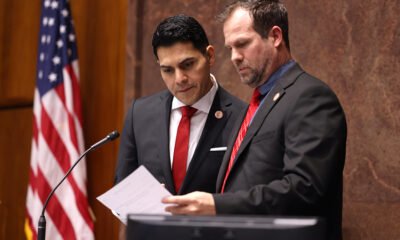covid
Schweikert Unifies Bipartisan Support to Axe COVID-Era Employee Retention Tax Credit

By Matthew Holloway |
On Tuesday, Republican Congressman David Schweikert, alongside Representatives Mike Kelly, Glenn Grothman, and Jared Golden, introduced the Employee Retention Tax Credit Repeal Act. This bipartisan legislation aims to expedite processing for small businesses by prohibiting the IRS from accepting COVID-19 Employee Retention Tax Credit (ERTC) claims after January 31, 2024. The bill also seeks to increase penalties for businesses and individuals committing fraud against the government.
Schweikert’s office stated that the ERTC was initially designed to support small businesses in keeping employees during the pandemic. Unfortunately, it has been marred by fraudulent claims, pushing legitimate applications to the side. The IRS placed the ERTC on its ‘Dirty Dozen’ list in 2023 due to rising instances of fraud.
IRS Commissioner Danny Werfel emphasized growing concerns over fraudulent claims in a recent statement. He noted a decline in genuine claims and called on Congress to assist in battling the issue. The Congressman’s office reiterated the need for legislative backing to help both the IRS and the U.S. Department of the Treasury combat this fraud.
The proposed ERTC Repeal Act could save taxpayers an estimated $79 billion over the next decade, as it is projected that continuing the program could lead to costs as high as $550 billion. “We’ve consistently heard from small businesses in our district about the backlog of claims,” Schweikert commented, citing 1.4 million pending returns. The early termination of the program aims to enable the IRS to focus on eliminating fraudulent claims while expediting the processing of legitimate ones.
Key features of the ERTC Repeal Act include substantial increases in penalties for promoters of fraudulent claims and a $1,000 penalty for non-compliance with due diligence requirements. Additionally, the statute of limitations for assessments would be extended to six years. Businesses promoting the ERTC could face penalties equivalent to 75% of their gross income derived from such services.
A similar measure has been introduced in the Senate by Senators Tom Tillis, Mitt Romney, and Joe Manchin. Tillis stated, “Repealing the ERTC is a critical step toward addressing America’s debt crisis,” highlighting the urgency of eliminating this fraudulent policy to regain fiscal stability.
The ERTC has contributed approximately $230 billion to the U.S. deficit through Fiscal Year 2023, with projections reaching up to $550 billion. The IRS has flagged between 10% and 20% of claims as clearly erroneous, with 60% to 70% presenting an unacceptable risk of being improper.
Currently, the ERTC is set to remain in effect until April 25, 2025.
Matthew Holloway is a reporter for AZ Free News. Follow him on X for his latest stories, or email tips to Matthew@azfreenews.com.

















